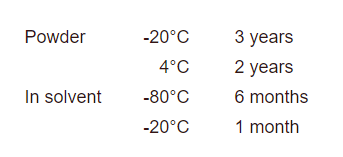Description
Amuvatinib (MP470) | HY-10206
Amuvatinib (MP470) is an orally bioavailable multi-targeted tyrosine kinase inhibitor with potent activity against mutant c-Kit, PDGFRα, Flt3, c-Met and c-Ret. Amuvatinib (MP470) is also a DNA repair suppressor through suppression of DNA repair protein RAD51, thereby disrupting DNA damage repair. Antineoplastic activity.
IC50 & Target:

In Vitro:
Amuvatinib (MP470) inhibits c-Kit (D816V), c-Kit (D816H), c-Kit (V560G), c-Kit (V654A), PDGFRα (D842V), and PDGFRα (V561D) with IC50s of 950 nM, 10 nM, 34 nM, 127 nM, 81 nM, and 40 nM, respectively.
Amuvatinib (MP470), a novel receptor tyrosine kinase (RTK) inhibitor has shown growth inhibitory activity against a variety of cancer cell lines. Amuvatinib (0.1-10 μM, 4 days incubation) is effective on LNCaP and PC-3 cells with IC50s of ~4 μM and 8 μM, respectively. When Erlotinib (10 μM) is combined with varying doses of Amuvatinib, the IC50 of Amuvatinib decreases to 2 μM on LNCaP cells.
Akt activity (as measured by phosphorylation on Ser473) is significantly reduced by 10 μM Amuvatinib (treated for 30 hours) alone but is not reduced by Erlotinib or Imatinib Mesylate (IM). Moreover, Amuvatinib plus Erlotinib completely abolished Akt phosphorylation in LNCaP cells with an unchanged total protein level of Akt.
In Vivo:
Four LNCaP xenograft arms each with 12 mice are dosed intraperitoneally with DMSO (control) or Erlotinib 80 mg/kg or Amuvatinib (MP470) 50 mg/kg or Erlotinib 80 mg/kg plus Amuvatinib 50 mg/kg daily for 2 weeks and then observed for a further 11 days. Individual therapy with Amuvatinib or Erlotinib shows modest tumor growth inhibition (TGI), while Amuvatinib plus Erlotinib has a marked effect on TGI (45-65%). However, due to the high doses of Amuvatinib used, only five or one mouse remained alive in the combination arm at the end of treatment or at the end of the study, respectively. Therefore the Amuvatinib dose is reduced to 10 mg/kg or 20 mg/kg for the combination treatment. TGI in the group receiving 10 mg/kg Amuvatinib+80 mg/kg Erlotinib is not significantly different from the control group. However, mice receiving 20 mg/kg Amuvatinib+80 mg/kg Erlotinib have a significant TGI compared to the control group (p=0.01).
Molecular weight:
447.51
Formula:
C23H21N5O3S
SMILES:
S=C(N1CCN(C2=C3OC4=CC=CC=C4C3=NC=N2)CC1)NCC5=CC=C6OCOC6=C5
Storage:







